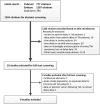Patient delay in TIA: a systematic review
- PMID: 30027321
- PMCID: PMC6469675
- DOI: 10.1007/s00415-018-8977-6
Patient delay in TIA: a systematic review
Abstract
Background: Patients who suffer a transient ischemic attack (TIA) have a high short-term risk of developing ischemic stroke, notably within the first 48 h. Timely diagnosis and urgent preventive treatment substantially reduce this risk. We conducted a systemic review to quantify patient delay in patients with (suspected) TIA, and assess determinants related to such delay.
Methods: A systematic review using MEDLINE and EMBASE databases up to March 2017 to identify studies reporting the time from onset of TIA symptoms to seeking medical help.
Results: We identified nine studies providing data on patient delay, published between 2006 and 2016, with 7/9 studies originating from the United Kingdom (UK). In total 1103 time-defined TIA patients (no remaining symptoms > 24 h), and 896 patients with a minor stroke (i.e., mild remaining symptoms > 24 h) were included (49.1% men, mean age 72.2 years). Patient's delay of more than 24 h was reported in 33.1-44.4% of TIA patients, with comparable proportions for minor stroke patients. Delays were on average shorter in patients interviewed at the emergency department than among patients seen at TIA outpatient clinics. Univariably associated with a shorter delay were (1) a longer duration of symptoms, (2) motor symptoms, (3) a higher ABCD2 score, and (4) correct patient's recognition as possible ischemic cerebrovascular event.
Conclusions: More than a third of patients experiencing a TIA delays medical attention for more than a day, thus critically extending the initiation of stroke preventive treatment. There still seems to be insufficient awareness among lay people that symptoms suggestive of TIA should be considered as an emergency. Additional data and multivariable analyses are needed to define main determinants of patient delay.
Keywords: Minor stroke; Patient delay; Systematic review; TIA.
Conflict of interest statement
Ethical standards
All studies in this review have been approved by the appropriate ethics committee and have therefore been performed in accordance with the ethical standards laid down in the 1964 Declaration of Helsinki and its later amendments.
Conflicts of interest
The authors declare that they have no conflict of interest.
Figures
References
-
- Rothwell PM, Giles MF, Chandratheva A, et al. Effect of urgent treatment of transient ischaemic attack and minor stroke on early recurrent stroke (EXPRESS study): a prospective population-based sequential comparison. Lancet. 2007;370(9596):1432–1442. doi: 10.1016/S0140-6736(07)61448-2. - DOI - PubMed
Publication types
MeSH terms
LinkOut - more resources
Full Text Sources
Other Literature Sources
Medical


